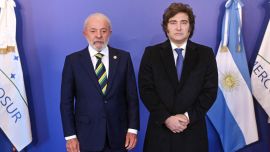All politics is local, it has often been said, and perhaps never more so than in the fortnight before an election but President Alberto Fernández carried this dictum to new extremes in last week’s global summitry. Nothing especially new about foreign policy being determined by domestic factors nor about isolationism, which has largely prevailed since Argentina turned its back on hemispheric integration at the Summit of the Americas in Mar del Plata in 2005 – the exception was the 2015-2019 administration of Mauricio Macri whose international outlook was one of its main saving graces, recruiting Susana Malcorra from the United Nations as the first foreign minister and hosting the 2018 G20 summit. But the current Frente de Todos administration is a fragmented coalition projecting all its internal splits into external policy, with the result that its diplomatic discourse not only continues to be isolationist, self-indulgent and anachronistic but also ambiguous, inconsistent and unpredictable.
The presidential insistence on seeing these global summits as a forum for begging for debt relief is obviously undignified but the damage runs deeper, taking the country off the world map as a player in any international league – Argentina is not interested in the world and the world responds to that disinterest with interest (or even surcharges on the interest). These summits tackle truly global problems like the pandemic and climate change (the exclusive subject of the COP26 in Glasgow and highly dominant in Rome) with Argentina cherishing the fond illusion that it could elevate debt overhang to a similar status as a worldwide problem but its lack of access to international credit markets is shared by very few other countries.
And what did Argentina bring to the table in Glasgow? Unable to grasp that the existential challenge of climate change was the exclusive subject there, the proposals of President Alberto Fernández on that front went constantly piggybacking debt relief – debt for nature swaps and a request for a new batch of special drawing rights from the International Monetary Fund in the name of “environmental solidarity,” apart from showing diminished enthusiasm for ambitious emission reduction targets since the “vulnerabilities and different capacities” of developing countries should be taken into account in the demands made on them. If Argentina is going to bring so little to the table, why was a delegation of over 100 people needed to bring it?
Alongside these conceptual criticisms, various minor criticisms of the president and his swollen delegation could be added such as the failure to apply the social distancing so long enforced during the pandemic to these international meetings in apparent ignorance of the diplomatic formalities and protocols or the limited use made by the delegation of the ample networking opportunities these occasions offer but such criticisms would be merely pedantic if the fundamentals of foreign policy were along the right lines.
Anyway the G20 summit was last weekend with COP26 immediately afterwards – this weekend features tomorrow’s Nicaraguan elections and here Argentine foreign policy has been found sorely wanting. It is quite simply disgraceful that a Kirchnerite movement priding itself on its defence of human rights and itself deeply respectful of democracy on the various occasions it has lost (including the recent PASO primaries) can find nothing wrong with a president now in his 25th year in power jailing dozens of opposition candidates, including his most serious rivals. Similar double standards have been applied to Cuba and Venezuela although a dysfunctional coalition does not make for total consistency even here. An ambiguity which makes it impossible to offer either the United States or China the clarity both demand.
Trade is another sphere finding Argentina off the map mostly of its own volition with the second-highest protective tariffs in South America and participating in no more than 20 commercial agreements. Mercosur is languishing, unable to evolve from the world of its birth 30 years ago, mostly because Argentine protectionism obstructs greater interaction with the world.
Argentina has been a member of the G20 ever since its formation in 1999 with Rome last weekend yet another chapter despite not qualifying quantitatively for this exclusive club as only the world’s 32nd largest economy – if it cannot qualify qualitatively either, it should not take membership for granted.






















Comments